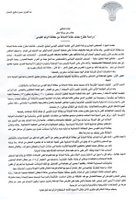Egypt's NCHR Symposium On Religion & ID Cards Coverage
TV Coverage of Egypt's National Council for Human Rights (NCHR) symposium on omitting religious classification from ID Cards, held in Cairo on 8 August 2006. (Credit: ALHURRA TV)
If unable to view it above, click here.
The first interview is with Mr. Nabil Abadir, Director-General of the Coptic Christian Social Services Authority. He stated that "religion is a personal and private matter which does not need to be a component of the ID Card system."
The second interview is with Mr. Shehata al-Gharib, Professor of Law at Assyout University. He said that "there are no 'personal status' laws in Egypt that apply to both Muslims and non-Muslims alike. This creates a conflict when applying these laws, and there is a need for laws that would be applicable to everyone."
The third interview is with Dr. Basma Mousa, Professor at the Faculty of Dentistry at Cairo University and representing the Baha'is. She elaborated that "the Baha'is have been in Egypt for over 150 years without problems in relation to Egyptian society until the National ID number was introduced in 2004 allowing only three religions to be registered (Muslim, Christian or Jewish). When Baha'is applied for the number they were told to either change their religion or the government would have nothing to do with them."
Three options were proposed by the symposium:
1) Omit religion from ID Cards.
2) Leave religion on ID Cards with the recognized three religions.
3) Recognize all religions and leave it up to the individual to choose whether or not to enter his or her religion on the ID Card.
For further details please read previous post here.











Bilo,
ReplyDeleteNice job covering this issue. Since you included this YouTube segment with alot of people on it, it would be helpful if you could code the second section of your post, the one below the YouTube video, according to the order of their(if they do appear) appearance on the video with the names/titles of people you describe, and what they say. In this way we can become familiar yet more with Egyptian leaders, and the issue becomes more memorable for us not able to understand Arabic.
Ok, my mistake, I see that I must have been looking at an earlier posting and commenting on the next (this one) posting. Sorry. I see you have identified the order of the first three speakers
ReplyDeleteNot at all! I updated it after your first comment.
ReplyDeleteBilo, thanks for your excellent coverage of this really troublesome issue for the Baha'is (and I assume for others) in Egypt. It can be difficult for those of us not familiar with Egypt to get a clear account of what's going on in Egyptian society, so your posts are very helpful.
ReplyDeleteI wonder if this issue is a litmust test for Egypt - rather like the treatment of the Baha'is in Iran is a litmust test for Iran.
It could very well be a litmus test. There are extremes of opinions in Egypt. There are those (Muslim fundamentalists) who are in total denial of the truth, attacking the Baha’is with vicious and false accusations. Also, there are those who are supportive, tolerant and understanding. The authorities will need to apply and enforce the constitutional guarantees--that are already in place--for every citizen.
ReplyDelete